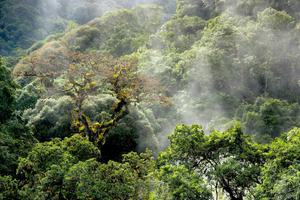Cofan community members patrol their land. Thomas J. Müller / USAID
Indigenous groups in Ecuador are blocking new mining and drilling projects, empowered by a February ruling from the country’s Constitutional Court, which requires that the government seek the consent of Indigenous people for projects that impact their land. Climate advocates are calling on other countries to provide similar legal protections to help preserve Indigenous lands.
“Now if any community says no, the state must respect that decision and guarantee what we want for our home,” Wider Guaramag, a Cofan community leader, told Reuters. Ecuador’s high court has rescinded gold concessions on Cofan lands in the Amazon as locals had not given their consent. Now Cofan community members are patrolling their territory, chasing away miners or reporting them to the authorities.
The victory for Ecuador’s native people comes as a new report says that lands managed by Indigenous groups store more carbon than other areas. Written by the World Resources Institute and Climate Focus, the report says that protecting Indigenous lands from mining, drilling, and logging is vital for meeting the goals of the Paris Agreement.
The report focuses on Brazil, Colombia, Mexico, and Peru, finding that lands held by Indigenous peoples and local communities in those countries absorb more than twice as much carbon as other lands. If officials fail to protect these territories, countries will have to take drastic measures to compensate for the lost carbon — the equivalent of taking 35 percent of vehicles off the road in Mexico and 80 percent off the road in Brazil and Colombia, the report said.
The report urges governments to legally recognize Indigenous lands and give Indigenous communities the right to prior consent of development projects, as in Ecuador.
“All four of the countries assessed in this brief only recognize the right of communities to be consulted rather than to give their consent,” the report says. “In many cases, consultations are regarded as a box-ticking exercise and do not provide a meaningful opportunity for communities’ concerns to be considered and fail to respect communities’ own institutions and norms.”
ALSO ON YALE E360
How Returning Lands to Native Tribes Is Helping Protect Nature



